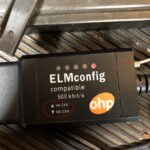OBD2 ports are valuable for diagnostics, but they don’t directly provide mileage. While some OBD2 devices estimate mileage based on trip data, this method is often inaccurate. This article explores why relying solely on OBD2 for mileage might not be the best solution and examines a more reliable alternative.
Why OBD2 Dongles Aren’t Ideal for Accurate Mileage
OBD2 dongles, primarily designed for vehicle diagnostics, calculate mileage by estimating distance traveled based on location and speed data. This indirect approach leads to several key drawbacks:
Inaccuracy and Incompleteness: The Core Issue
OBD2 dongles don’t access the vehicle’s odometer directly. They infer mileage, leading to potential inaccuracies that can significantly impact applications like insurance premiums or usage-based billing. Small errors accumulate, and misjudging trip start/end points further skews results. Additionally, data from the OBD2 port lacks crucial details like precise location and true odometer readings, limiting its comprehensiveness. Some electric vehicles further complicate matters by requiring special adapters for OBD2 devices, highlighting compatibility issues.
Unintentional Failures and Inconvenience
Even with proper installation, OBD2 dongles can malfunction, trigger false alarms, or drain vehicle batteries. Loose connections disrupt data collection, and drivers often find the installation and maintenance of these devices cumbersome. A dislodged dongle can lead to data gaps, causing billing errors or service interruptions.
Software Incompatibility Challenges
OBD2 dongles often operate on separate platforms that don’t integrate seamlessly with existing business systems. This lack of integration creates extra work for companies trying to synchronize mileage data with their current tools, leading to operational inefficiencies.
Intentional Tampering and Mileage Fraud
The potential for manipulation is a major concern with OBD2 dongles. Drivers can easily disconnect the device to avoid recording mileage, leading to underreported usage and significant financial losses for businesses relying on accurate mileage data. This vulnerability makes OBD2 dongles susceptible to mileage fraud, a costly problem for insurance companies and other mobility services.
Privacy Concerns in a Data-Driven World
Consumers are increasingly concerned about data privacy. OBD2 dongles, constantly collecting data, raise questions about what information is being gathered, who has access to it, and how it’s being used. This lack of transparency can erode trust and create discomfort for drivers wary of continuous monitoring.
High Expenses and Hidden Costs
Using OBD2 dongles involves significant expenses, including hardware costs, shipping, replacement of lost or damaged devices, and ongoing subscription fees. These costs can quickly escalate, especially for businesses managing large fleets or scaling their operations. The financial burden of hardware-dependent solutions often outweighs their benefits.
A Better Alternative: Connected Car APIs for Accurate Mileage
Leveraging a connected car API offers a more robust and reliable solution for mileage verification. Platforms like Smartcar provide direct access to a vehicle’s odometer, ensuring accuracy and eliminating the estimation errors associated with OBD2 dongles.
Accuracy and Reliability: Direct Access to Odometer Data
APIs retrieve the actual odometer reading from the vehicle, providing precise mileage data without relying on calculations or estimations. This eliminates inaccuracies, ensures consistent data collection, and prevents data gaps caused by disconnections or tampering.
Seamless Integration and Ease of Use
Connected car APIs offer simple integration with existing business systems, streamlining data management and eliminating compatibility issues. User-friendly onboarding processes, often requiring just a few clicks, make it easy for customers to connect their vehicles and grant data access permissions.
Enhanced Privacy and Transparency
Permission-based access models ensure data transparency and empower customers to control what information is shared. This explicit consent fosters trust and addresses privacy concerns associated with continuous data collection by OBD2 devices.
Cost-Effectiveness and Scalability
Software-based API solutions eliminate the need for hardware, shipping, and ongoing maintenance, significantly reducing costs compared to OBD2 dongles. Scalable pricing models allow businesses to adjust their usage and avoid unnecessary expenses.
Connected car APIs offer a superior alternative to OBD2 dongles for mileage verification, providing accurate, reliable, and cost-effective solutions while prioritizing user privacy and data security. For businesses seeking scalable and trustworthy mileage data, exploring a connected car API platform is a worthwhile investment.


